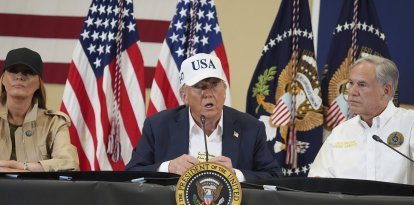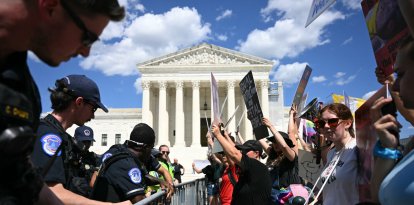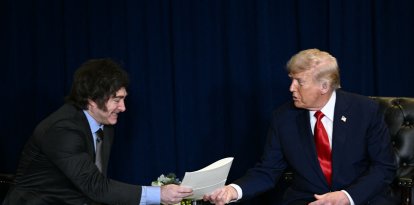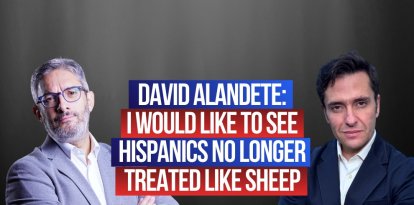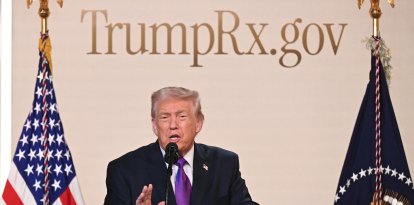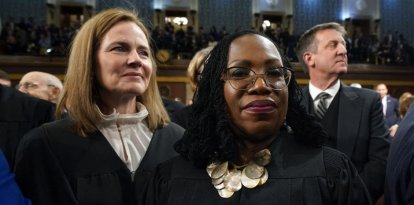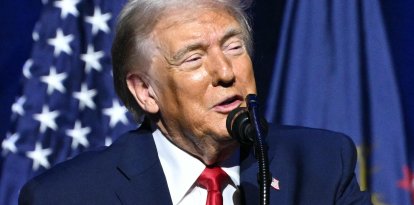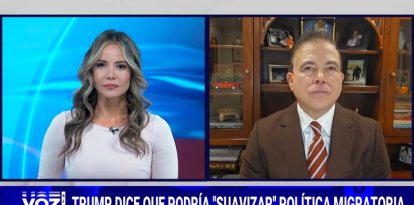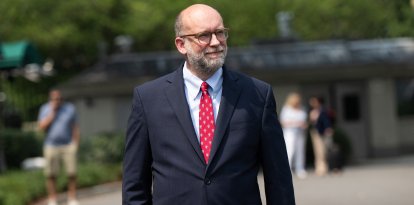ANALYSIS.
Where does Trump's animus for Zelensky come from?
The relationship between the leaders has taken a turn since their first cordial exchange in 2019. The history of their relationship, vital to the resolution of the war, may help to understand their current animosity.
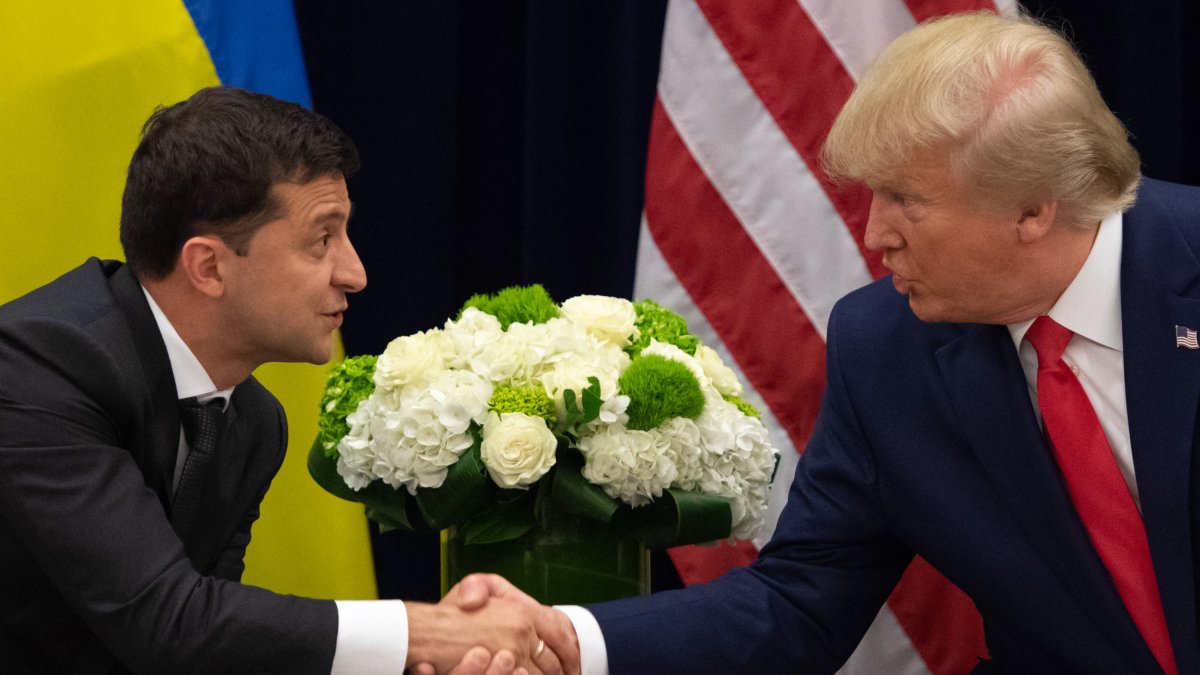
Presidents Trump and Zelensky in 2019.
"Brave." Donald Trump chose that adjective to describe Volodymyr Zelensky seven years ago, just days after the Russian invasion on Feb. 24, 2022. Three years of conflict later, the reelected president's tone toward his Ukrainian counterpart has taken a turn: "A dictator," who has done "a terrible job."
In his speech at CPAC 2022, Trump applauded the Ukrainian leader's decision to hold out in Kiev against advancing Russian troops. Then just the former president, the Republican pointed the blame at Moscow: "The Russian attack on Ukraine is appalling" In his statements in recent weeks he seemed to reverse responsibilities.
Although some analysts and official sources state that the U.S. president's stance may respond to a negotiating strategy for Europe to take more of a leading role in its own defense and for Zelensky to yield to his mining demands, the history of the leaders' relationship is littered with friction that may help to understand the current animosity.
Call for impeachment
During his first term, Trump struck economic and military deals with Ukraine that served as signs of goodwill, such as sales of coal and locomotives from Pennsylvania.
When Zelensky won the election in 2019, the Republican congratulated him on his "incredible election": "You will do a great job." But even their first phone conversation proved problematic: the call was used by the Democrats as fuel for their first impeachment attempt.
Trump asked the former comedian and actor to launch an investigation to determine whether Joe Biden had leveraged the vice presidency to stall an inquiry into his son Hunter's overseas business dealings. What Trump described as a "favor," to Congress was a quid pro quo in which the president allegedly abused his office by putting military aid as a condition for his request to be fulfilled.
Beyond the controversy, the transcripts of the call show a cordial relationship. The European leader told Trump that he enjoyed talking to him and wanted to "drain the swamp": "You are a great teacher for us and in that. ... I also wanted to tell you that we are friends," Zelensky says at another point, then pledges that a prosecutor he trusts "will look into the situation."
After the controversy broke out, the Ukrainian president asserted that no blackmail had occurred. He also tried to remain neutral, avoiding comment on the impeachment process. John Bolton, Trump's former national security advisor, now estranged from Trump, asserted to The Wall Street Journal that his former boss never forgave Zelensky for the fallout from the call.
Zelensky cozies up to Democrats
During last year's presidential election, the Ukrainian leader was accused numerous times from the Republican camp of openly showing favoritism for the Democratic ticket.
After Trump promised at a campaign rally that, if he won, he would end the war in a day, Zelensky said in an interview with The New Yorker that even if he thought he knew how to do it, the candidate really didn't know how. "I’ve seen many leaders who were convinced they knew how to end it tomorrow, and as they waded deeper into it, they realized it’s not that simple," he continued.
Zelensky said vice presidential candidate J.D. Vance was "too radical." He stressed, however, that his opinion of Trump was better: "He and I talked on the phone, and his message was as positive as it could be, from my point of view. 'I understand,' 'I will lend support,' and so on."
Another episode even led the Republican House Oversight Committee to open an investigation against the Ukrainian leader for starring in campaign rallies with Kamala Harris in the swing state of Pennsylvania.
Although Trump accused Zelensky of making "little nasty aspersions" against him, the two held a meeting in New York, after which they offered joint statements.
"I think [the Ukrainian leader] he had little room to step outside the partisan ring in Europe and the U.S.," wrote journalist and analyst Marcel Gascón for VOZ. He needed, Gascón argues, weapons and money to push back against Russia, and both were in the hands of the Democrats.
Disinformation bubble
"President Trump, whom we respect very much as a leader of the American people, unfortunately lives in this space of disinformation... [which] comes from Russia," Zelensky maintained following the U.S.-Russia summit, to which Ukraine was not invited.
Although he did not go into details, that opinion would seem to be in line with a favorite explanation of the U.S. left. Those who affirm it put host Tucker Carlson as the best exponent of a group of conservatives who have been turning toward Russia. Last year, Carlson traveled to Moscow and showed a favorable profile of the country and its leader.
Trump, they say, has been influenced by this group. As "evidence," they point to two cabinet members, whom they also accuse of being pro-Russia: Tulsi Gabbard and Robert F Kennedy. They also claim that his conversations with Putin reinforced his antipathy for Zelensky.
Escalation from Riyadh
The summit between senior U.S. and Russian officials in Saudi Arabia accelerated public animosity. Ukraine was not invited. Its president claimed that he had learned of the meeting from the media, which had been planned "behind Ukraine's back." He even planned to travel to Riyadh the day after the meeting.
The back and forth in the press continued with Trump accusing him of being a "dictator" and saying he had three years to sit at the table. Zelensky retorted that Trump was living in a "space of disinformation," and hours later received the accusation of having done a "terrible" job in addition to having lost billions in U.S. aid.
In his latest statements, the Ukrainian leader tried to quell the controversy. "I certainly would not describe the words used by Trump as a compliment," he said, in addition to denying that he was a dictator.















